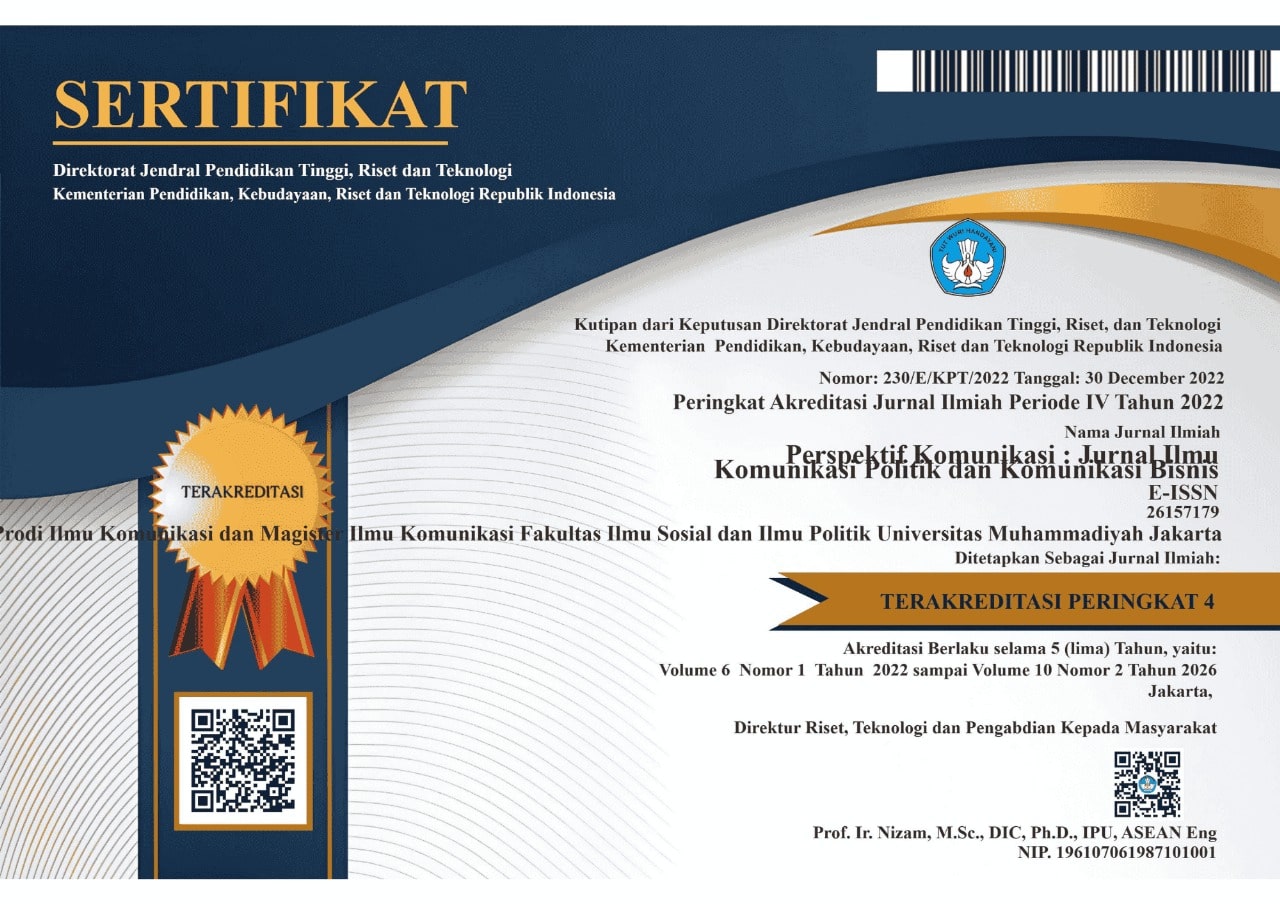KOMUNIKASI KONSEP KEDAULATAN PANGAN DALAM JARINGAN ADVOKASI TRANSNASIONAL
Abstract
La Via Campesina (LVC), sebuah gerakan agraria transnasional, telah aktif terlibat dalam mempromosikan kedaulatan pangan sebagai alternatif dari krisis pangan global. Untuk menyebarkan gerakan kedaulatan pangan, komunikasi antara anggota LVC lokal, nasional, dan global sangat diperlukan. Artikel ini bertujuan untuk mengkaji praktik komunikasi Serikat Petani Indonesia (SPI), sebuah organisasi gerakan sosial tani asal Indonesia yang merupakan anggota LVC, dalam mengkomunikasikan konsep kedaulatan pangan kepada seluruh anggotanya. Metode kualitatif digunakan dalam penelitian ini dengan data primer berasal dari pertemuan-pertemuan, seperti konferensi atau diskusi publik yang diselenggarakan atau dihadiri oleh anggota SPI dan LVC. Pengumpulan data dari wawancara mendalam dengan anggota SPI dan LVC juga dilakukan sebagai data primer. Data sekunder yang digunakan dalam penelitian ini berupa teks, video, dan rekaman yang dihasilkan oleh LVC juga digunakan untuk memperkaya hasil penelitian ini. Dengan menggunakan etnografi komunikasi sebagai metode dalam pengumpulan data, penulis menemukan bagaimana LVC mendefinisikan, merundingkan, dan mempertahankan makna kedaulatan pangan, yaitu: 1) setiap tingkatan memiliki fungsi dan kerangkanya sendiri dalam mengkomunikasikan kedaulatan pangan; 2) mengkomunikasikan posisi atau sikap terhadap isu-isu pertanian di LVC dianggap penting agar anggota dapat memahami makna kedaulatan pangan dalam kehidupan mereka; dan 3) isu-isu dari semua tingkatan terwakili dengan baik dalam teks-teks yang diproduksi oleh LVC.
Keywords
Full Text:
PDFReferences
Andrews, A. (2010a). Constructing mutuality: The Zapatistas’ Transformation of Transnational Activist Power Dynamics. Latin American Politics and Society, 52(1), 89–120. https://doi.org/10.1111/j.1548-2456.2010.00075.x
Andrews, A. (2010b). How Activists “Take Zapatismo Home”: South-to-North Dynamics in Transnational Social Movements. Latin American Perspectives, 38(1), 138–152. https://doi.org/10.1177/0094582X10384217
Ashcraft, K. L., Kuhn, T. R., & Cooren, F. (2009). Constitutional Amendments: “Materializing” Organizational Communication. The Academy of Management Annals, 3(1), 1–64. https://doi.org/10.1080/19416520903047186
Baletti, B., Johnson, T. M., & Wolford, W. (2008). “Late Mobilization”: Transnational peasant networks and grassroots organizing in Brazil and South Africa. Journal of Agrarian Change, 8(2–3), 290–314. https://doi.org/10.1111/j.1471-0366.2008.00171.x
Binnie, J., & Klesse, C. (2012). Solidarities and tensions: Feminism and transnational LGBTQ politics in Poland. European Journal of Women’s Studies, 19(4), 444–459. https://doi.org/10.1177/1350506812466610
Borras, S. M. (2010). The Politics of Transnational Agrarian Movements. Development and Change, 41(5), 771–803. https://doi.org/10.1111/j.1467-7660.2010.01661.x
Boyer, J. (2010). Food security, food sovereignty, and local challenges for transnational agrarian movements: the Honduras case. Journal of Peasant Studies, 37(2), 319–351. https://doi.org/10.1080/03066151003594997
Brochner, G. P. M. (2014). Peasant Women in Latin America : Transnational Networking for Food Sovereignty as an Empowerment Tool. Latin American Policy, 5(2), 251–264. Retrieved from http://onlinelibrary.wiley.com.ezproxy2.apus.edu/doi/10.1111/lamp.12054/epdf
Brummans, B. H. J. M., Cooren, F., Robichaud, D., & Taylor, J. R. (2014). Approaches to the Communicative Constitution of Organizations. In L. L. Putnam & D. K. Mumby (Eds.), The SAGE Handbook of Organizational Communication: Advances in Theory, Research, and Methods (Third Edit). Thousand Oaks, CA: SAGE Publications.
Caouette, D. (2007). Going transnational?: Dynamics and challenges of linking local claims to global advocacy networks in Southeast Asia. Pacific Focus, 22(2), 141–166. https://doi.org/10.1111/j.1976-5118.2007.tb00300.x
Claeys, P. (2012). The Creation of New Rights by the Food Sovereignty Movement: The Challenge of Institutionalizing Subversion. Sociology, 46(5), 844–860. https://doi.org/10.1177/0038038512451534
Cooren, F., Kuhn, T. R., Cornelissen, J. P., & Clark, T. (2011). Communication, organizing and organization: an overview and introduction to the special issue. Organization Studies, 32(9), 1149–1170. https://doi.org/10.1177/0170840611410836
Creswell, J. W. (2009). Research Design: Qualitative, Quantitative, and Mixed Methods Approaches (3rd ed.). Thousand Oaks, CA: SAGE Publications.
Doherty, B., & Doyle, T. (2006). Beyond borders: Transnational politics, social movements and modern environmentalisms. Environmental Politics, 15(5), 697–712. https://doi.org/10.1080/09644010600937132
Dunford, R. (2014). Human rights and collective emancipation: The politics of food sovereignty. Review of International Studies, 41(02), 239–261. https://doi.org/10.1017/S0260210514000187
Edelman, M. (2014). Food sovereignty: forgotten genealogies and future regulatory challenges. Journal of Peasant Studies, 41(6), 1–20. https://doi.org/10.1080/03066150.2013.876998
Fominaya, C. F. (2010). Creating Cohesion from Diversity: The Challenge of Collective Identity Formation in the Global Justice Movement. Sociological Inquiry, 80(3), 377–404. https://doi.org/10.1111/j.1475-682X.2010.00339.x
Friedman, E. (2009). External Pressure and Local Mobilization: Transnational Activism and the Emergence of the Chinese Labor Movement. Mobilization: An International Journal, 14(2), 121–199. https://doi.org/10.17813/maiq.14.2.328913653020k1l9
Hymes, D. (1967). The anthropology of Communication. In Human Communication Theory : Original Essays (pp. 1–39).
Hymes, D. (1972). Toward Ethnographies of Communication. In P. P. Giglioli (Ed.), Language and Social Context. London: Penguin. https://doi.org/10.1525/aa.1964.66.suppl_3.02a00010
Koohafkan, P., & Altieri, M. A. (2011). Globally Important Agricultural Heritage Systems A Legacy for the Future. Rome: Food and Agriculture Organizations. Retrieved from http://www.fao.org/fileadmin/templates/giahs/PDF/GIAHS_Booklet_EN_WEB2011.pdf
Koschmann, M. A. (2012). The Communicative Constitution of Collective Identity in Interorganizational Collaboration. Management Communication Quarterly, 27(1), 61–89. https://doi.org/10.1177/0893318912449314
Lerche, J. (2008). Transnational advocacy networks and affirmative action for Dalits in India. Development and Change, 39(2), 239–261. https://doi.org/10.1111/j.1467-7660.2007.00478.x
Levitt, P., & Merry, S. (2009). Vernacularization on the ground: Local uses of global women’s rights in Peru, China, India and the United States. Global Networks, 9(4), 441–461. https://doi.org/10.1111/j.1471-0374.2009.00263.x
Lindell, I. (2009). “Glocal” movements: Place struggles and transnational organizing by informal workers. Geografiska Annaler, Series B: Human Geography, 91(2), 123–136. https://doi.org/10.1111/j.1468-0467.2009.00310.x
LVC. (2009). La Via Campesina: The International Peasant’s Voice. Retrieved December 2, 2016, from https://viacampesina.org/en/index.php/main-issues-mainmenu-27
Marcus, G. E. (1995). Ethnography in/of the World System: The Emergence of Multi-Sited Ethnography. Annual Review of Anthropology, 24, 95–117.
McKeon, N. (2013). ‘One Does Not Sell the Land Upon Which the People Walk’: Land Grabbing, Transnational Rural Social Movements, and Global Governance. Globalizations, 10(1), 105–122. https://doi.org/10.1080/14747731.2013.760911
McMichael, P. (2014). Historicizing food sovereignty. Journal of Peasant Studies, 41, 1–25. https://doi.org/10.1080/03066150.2013.876999
Miles, M. B., Huberman, A. M., & Saldana, J. (2014). Qualitative Data Analysis: A Methods Sourcebook (3rd Editio). London: SAGE Publications.
Peluso, N. L., Afiff, S., & Rachman, N. F. (2008). Claiming the grounds for reform: Agrarian and environmental movements in Indonesia. Journal of Agrarian Change, 8(2–3), 377–407. https://doi.org/10.1111/j.1471-0366.2008.00174.x
Purwanto, H. (2012). Serikat Petani Indonesia dalam Perjuangan Pembaruan Agraria Periode 1998-2011. Universitas Indonesia.
Pye, O. (2010). The biofuel connection – transnational activism and the palm oil boom. Journal of Peasant Studies, 37(4), 851–874. https://doi.org/10.1080/03066150.2010.512461
Richards, L. (1999). Data Alive! The Thinking Behind NVivo. Qualitative Health Research, 9(3), 412–428. https://doi.org/10.1177/104973239900900310
Rosset, P. M., Patel, R., & Courville, M. (2006). Promised Land: Competing Visions of Agrarian Reform. New York: Food First Books.
Saville-Troike, M. (2008). The Ethnography of Communication: An Introduction: Third Edition. In The Ethnography of Communication: An Introduction (3rd ed.). Oxford, UK: Blackwell Publishing Ltd. https://doi.org/10.1002/9780470758373
Seminar, A. U., Sarwoprasodjo, S., Santosa, D. A., & Kinseng, R. A. (2017). Agroecological Education Aimed at Achieving Food Sovereignty. Journal of Developments in Sustainable Agriculture, 12(1), 34–44.
Shawki, N. (2013). Understanding the Transnational Diffusion of Social Movements: An Analysis of the U.S. Solidarity Economy Network and Transition US. Humanity & Society, 37(2), 131–158. https://doi.org/10.1177/0160597613481799
Swerts, T. (2013). The democratic deficit of transnational environmental activism: A case study of e-waste governance in India. Global Networks, 13(4), 498–516. https://doi.org/10.1111/glob.12009
Taylor, J. R., & Cooren, F. (1997). What makes communication ‘organizational’? Journal of Pragmatics, 27(4), 409–438. https://doi.org/10.1016/S0378-2166(96)00044-6
Yin, R. K. (2003). Case Study Research Design and Methods. In SAGE Publications (3rd ed.). Thousand Oaks, CA: SAGE Publications. https://doi.org/10.1097/FCH.0b013e31822dda9e
DOI: https://doi.org/10.24853/pk.5.2.200-211
Refbacks
- There are currently no refbacks.

Journal © 2018 by Perspektif Komunikasi: Jurnal Ilmu Komunikasi Politik dan Komunikasi Bisnis is licensed under CC BY-SA 4.0
This work is licensed under a Creative Commons Attribution-NonCommercial 4.0 International License
My Stats
 ::
::











1.png)




_2.png)


1.png)

2.png)